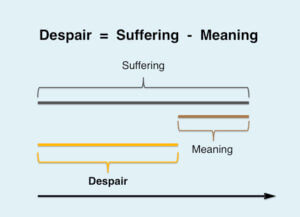They say “you are what you measure”, and to add to that I have also posited that we are not simply rational beings, but driven far more by emotion and energy (or e-motion, if you will, energy in motion), as I wrote in “sentio ergo sum“. I also attended the wonderful Kilkenomics festival in November 2017 and observed a theme of the inadequacy and incompleteness of classical economic models that effectively try to boil down everything of “utility” into monetary terms.
So, in coming posts, I will look at various equations that focus on what one of my business heroes wrote about several years ago in looking take meaning from his own suffering. I’m not only inspired by Chip Conley and his idea of Emotional Equations, but also the fact that he was inspired by the book that, above all others, has the most meaning to me.
The story of this starts with :
Despair = Suffering – Meaning

This was the equation Chip Conley started within 2012 at a particularly tough time in his life, as he noted in this interview :
“I was reading Man’s Search for Meaning by Victor Frankl during a very difficult point in my life. Frankl’s perspective is that meaning is the fuel of life. He writes about getting to test that theory while he was in a concentration camp: Can the idea of meaning actually keep people alive?
Well, I was going through a really tough time about four years ago. I was the CEO of a company with 3,500 employees. When you’re a CEO or any kind of leader, you’re the emotional thermostat of those whom you’re leading. At that time, I felt that my emotional thermostat was very low. A lot of things were going wrong in my life, and I was almost in a state of desperation. I felt like I needed to take the profound content of Man’s Search for Meaning and turn it into something that was actionable on a daily basis. Math is about relationships–the relationship of numbers–but I decided that maybe it could be about the relationship of emotions. Specifically, I wanted to find a meaning equation that was solution-driven, simple and concise. At the time I had no idea that there was going to be a book in it. I was just trying to fix my life.
This is the equation I started with: despair equals suffering minus meaning. Let me explain the “sacred algebra.” If you’re going through a period of suffering, like Victor Frankl in a concentration camp, or me in my own mental prison, it’s as though everything is going wrong, as though you’re in a downward spiral. When you’re in that place in life, suffering does feel like a constant.
If you believe in Buddhist philosophy and thinking, the first noble truth of Buddhism is that suffering is ever present. So think of suffering as the constant. Think of meaning as the variable. If you remember back to algebra, there is often a constant and a variable in an equation. If suffering remains the constant, then when you increase meaning (the variable) despair goes down.”
So, from this thinking, Chip took an inventory of his own emotional equations, then in 2012 wrote the book Emotional Equations.
There is more in-depth on the Emotional Equations site, including numerous examples of emotional equations, including these.
Please do share your own emotional equations. Like Chip, such sharing of what resonates for us as individuals can have meaning for others.
Authenticity = Self-Awareness x Courage
Curiousity = Wonder x Awe
Joy = Love – Fear
Anxiety = Uncertainty x Powerlessness
